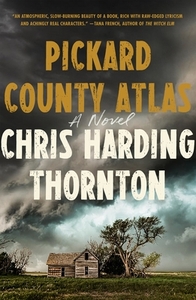You need to sign in or sign up before continuing.
Take a photo of a barcode or cover
BOOKS: 3: Okay, so this one was not my shot of whiskey. And I'm torn on how to review this. It's not that it's a bad story, I think it's simply one of those stories that hits a very personal raw nerve. Pickard County Atlas is set in a dusty town in Nebraska's Sandhills in the summer of 1979 and takes place over the course of a few days. It hones in on two families, each ripped apart by tragedy, whose paths come colliding together in one ultimate showdown.
Having grown up in a small town (which I hated and, I'll be honest, I have a large bias), I've read small-town stories that I absolutely adored (The Wolf Wants In by Laura McHugh comes immediately to mind and 100% recommend that!) so I can't even say for certain that's where my dislike comes from. I finished it, so it's at least a halfway engaging story. However, I felt the characters were all terrible; the only one I semi-liked was the matriarch of the Reddick clan and she doesn't even show up - and never speaks for herself - until the last twenty pages or so of the story. As is the case in most literary fiction I read, I didn't feel any of them were well-developed and in discussing their backstory, simple explanations were given for what were, in actuality, very traumatic events.
*SPOILER* And I suppose therein lies most of my dislike for this story. By the time all is revealed, it's simply a small-town WYSIWYG mystery. I was expecting twists at the end: that the secrets and the lies by omission were actually hiding something in the shadows. But no. The peppering of clues throughout only revealed some basic bitch, plain-as-day - albeit, odd - literary metaphor of death and the cycles of trauma that people, especially small town folks, seem doomed to repeat because big fish, little pond and all that.
Things I did like:
1. The setting. It's clear that Thornton knows her Nebraska. Thorton's a seventh-generation Nebraskan, and, in her writing, you can really sense the Sandhills, in all their dryness, in the middle of summer. It did make me appreciate my recent travels to western Nebraska so that I could visualize what the characters were seeing.
2. The characters. Right, okay, so I said I hated them all, and that's still true. But Thornton does an excellent job at showing what small town life is like. I'll be honest, I love the concept of a small town: the rural, slow, lifestyle, the "neighborhood watch" of looking out for one another and having each other's back. But that's a pretty piece of fiction, unlike any small town I've ever encountered. Instead of neighborly goodness you get malicious bullying, nosiness and gossip. And that's exactly what Thornton shows.
Having grown up in a small town (which I hated and, I'll be honest, I have a large bias), I've read small-town stories that I absolutely adored (The Wolf Wants In by Laura McHugh comes immediately to mind and 100% recommend that!) so I can't even say for certain that's where my dislike comes from. I finished it, so it's at least a halfway engaging story. However, I felt the characters were all terrible; the only one I semi-liked was the matriarch of the Reddick clan and she doesn't even show up - and never speaks for herself - until the last twenty pages or so of the story. As is the case in most literary fiction I read, I didn't feel any of them were well-developed and in discussing their backstory, simple explanations were given for what were, in actuality, very traumatic events.
*SPOILER* And I suppose therein lies most of my dislike for this story. By the time all is revealed, it's simply a small-town WYSIWYG mystery. I was expecting twists at the end: that the secrets and the lies by omission were actually hiding something in the shadows. But no. The peppering of clues throughout only revealed some basic bitch, plain-as-day - albeit, odd - literary metaphor of death and the cycles of trauma that people, especially small town folks, seem doomed to repeat because big fish, little pond and all that.
Things I did like:
1. The setting. It's clear that Thornton knows her Nebraska. Thorton's a seventh-generation Nebraskan, and, in her writing, you can really sense the Sandhills, in all their dryness, in the middle of summer. It did make me appreciate my recent travels to western Nebraska so that I could visualize what the characters were seeing.
2. The characters. Right, okay, so I said I hated them all, and that's still true. But Thornton does an excellent job at showing what small town life is like. I'll be honest, I love the concept of a small town: the rural, slow, lifestyle, the "neighborhood watch" of looking out for one another and having each other's back. But that's a pretty piece of fiction, unlike any small town I've ever encountered. Instead of neighborly goodness you get malicious bullying, nosiness and gossip. And that's exactly what Thornton shows.
dark
mysterious
medium-paced
Plot or Character Driven:
A mix
Strong character development:
Yes
Loveable characters:
No
Diverse cast of characters:
N/A
Flaws of characters a main focus:
N/A
US working class white folks are the subject of many nowadays. Most are insightful and capture the angst of mid-Americans working with little prospect of much to show for it. Unfortunately for me this effort's attempt is clumsy and more than occasionally condescending. The writer wants us to believe that she is knowledgeable about this culture but evidences she really isn't. (Cars do not run fast when started because the timing is off, it is almost always the auto choke, for example.) Making fun of the decor of double wide trailers is embarrassing. In the end, however, the moral of the story seems to be that an unhappy housewife is appropriate in her disliking her daughter whom she attempts to abandon in a clothing store, having sexual relations on impulse, and regretting her husband's hard efforts to support the family. I do give respect to the ambiguity of the dialogue. Conversations are terse and incomplete, explained more by the situation than the words. Also well done are the somewhat odd personalities the brothers, one a family embarrassment is actually given to insight and philosophic comment. The other is hard working and dedicated to family. How they end up is not credible however. And the end is absurd.
dark
tense
medium-paced
Plot or Character Driven:
Character
Strong character development:
Complicated
Loveable characters:
No
Diverse cast of characters:
Complicated
Flaws of characters a main focus:
Yes
The setting is so well crafted it can be mapped out in your mind as you read. The characters are equally good, having their own distinct voices, flaws and virtues.
It's a slow burn and something of a modern western. Certainly not a happy book. The writing is beautiful.
It's a slow burn and something of a modern western. Certainly not a happy book. The writing is beautiful.
challenging
dark
emotional
mysterious
tense
fast-paced
Plot or Character Driven:
Character
Strong character development:
Yes
Loveable characters:
Complicated
Diverse cast of characters:
No
Flaws of characters a main focus:
Yes
Graphic: Domestic abuse
Not sure what to make of this book. I think I give it 2.5 stars, rounded up to 3. It took me forever to read, and I kept waiting for something to happen. The actual "mystery" was not something I cared about.
3.5 An engaging thriller with a western twist. Great descriptions and awareness of existence at the edge of poverty and small western town life.
I’m sure this was a good book. The writing was beautiful and really evoked the time, place, and feel of the novel.
I just don’t care for books where there’s nobody to like nor pull for. I honestly didn’t care what happened to any of the characters so this particular book just didn’t appeal to me.
I just don’t care for books where there’s nobody to like nor pull for. I honestly didn’t care what happened to any of the characters so this particular book just didn’t appeal to me.





